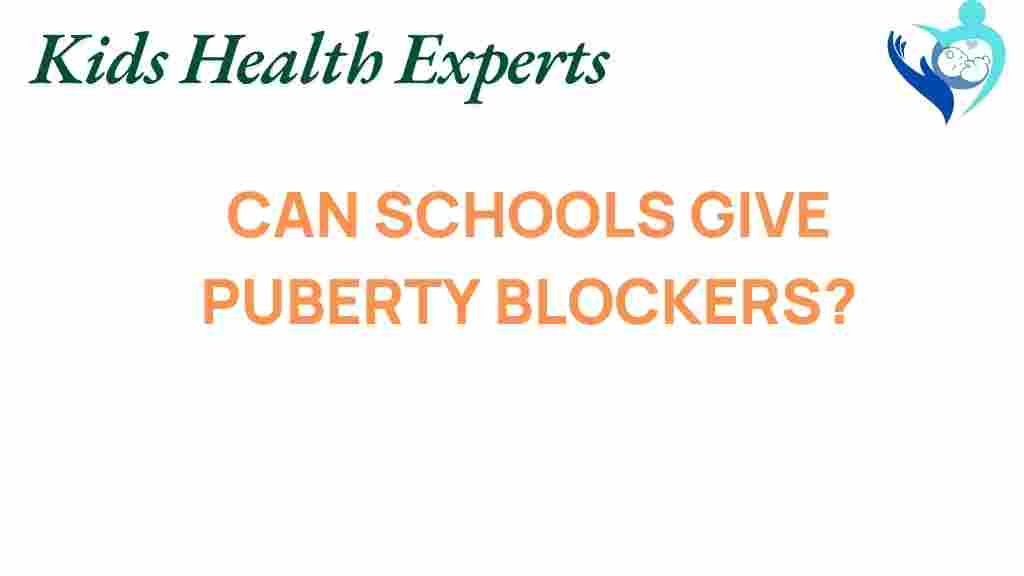Can Schools Administer Puberty Blockers?
The topic of puberty blockers in the context of schools has emerged as a crucial issue in the ongoing discussions around transgender youth and their rights. As educational institutions strive to create inclusive environments, the question of whether they can administer puberty blockers is at the forefront of education policy, medical consent, and child welfare. This article explores this complex debate, examining the implications for mental health, parental rights, and the overall well-being of students.
Understanding Puberty Blockers
Puberty blockers are medications that can pause the physical changes associated with puberty. These medications are often prescribed to young individuals experiencing gender dysphoria, giving them time to explore their gender identity without the distress of undergoing unwanted physical changes. The use of puberty blockers can be a significant aspect of care for transgender youth.
The Role of Schools in Health Care
Schools traditionally focus on education, but they increasingly recognize their role in supporting the health and well-being of students. This recognition raises questions about the extent of their involvement in medical decisions:
- Can schools provide medical interventions like puberty blockers?
- What are the legal frameworks surrounding medical consent in educational settings?
- How do education policies address the needs of transgender youth?
Current Education Policies and Medical Consent
Education policies vary significantly by state and district, affecting how schools can approach the administration of puberty blockers. Here are key considerations:
- Medical Consent: In many jurisdictions, minors require parental consent to receive medical treatments, including puberty blockers. This creates a potential conflict between parental rights and the autonomy of transgender youth.
- School Nurses and Health Staff: Some schools have trained health professionals who may play a role in assessing the needs of students. However, the legal scope of their practice often limits them from administering hormonal treatments without explicit guidelines.
- Policy Development: Many schools are developing policies to support transgender youth better, but the implementation of these policies can be inconsistent.
The Debate Over Administration of Puberty Blockers in Schools
The discussion about whether schools can administer puberty blockers often centers on several contentious issues, including:
- Child Welfare: Advocates argue that timely access to puberty blockers can prevent severe mental health issues for transgender youth, including depression and anxiety.
- Parental Rights: Opponents express concerns that schools could undermine parental authority by making medical decisions without parental involvement.
- Education Policy: The role of schools in health care raises questions about the appropriateness of educational settings for medical interventions.
Mental Health Considerations
The mental health of transgender youth is a critical factor in this debate. Research suggests that access to puberty blockers can significantly improve mental health outcomes:
- Reduced risk of depression and anxiety
- Decreased suicidal ideation
- Improved overall life satisfaction
Given these benefits, many advocates argue that schools should have the ability to facilitate access to puberty blockers for students who need them. However, this must be balanced with considerations of parental rights and medical ethics.
Step-by-Step Process for Schools to Support Transgender Youth
If schools aim to support transgender youth in their journey, they can consider the following steps:
- Policy Development: Establish clear policies that outline how schools will support transgender students and address medical needs.
- Training for Staff: Provide training for teachers and school staff on gender identity and the importance of supporting transgender youth.
- Collaboration with Health Professionals: Partner with local health providers to ensure students have access to appropriate care, including puberty blockers.
- Engagement with Parents: Foster open communication with parents while respecting student confidentiality and autonomy.
- Support Systems: Create safe spaces and support groups within the school for transgender youth to share their experiences.
Challenges and Troubleshooting Tips
Implementing policies related to puberty blockers in schools can present challenges. Here are some common issues and troubleshooting tips:
- Resistance from Parents: Some parents may oppose the idea of schools being involved in their child’s medical care. To address this, schools should provide educational resources and host forums to discuss the benefits of supporting transgender youth.
- Legal Concerns: Schools may fear legal repercussions related to medical consent. Consulting with legal experts on education and health law can clarify what actions are permissible.
- Staff Training Gaps: Lack of staff training can hinder the implementation of inclusive policies. Schools should prioritize ongoing training programs for all staff members.
Conclusion
The question of whether schools can administer puberty blockers is an intricate issue that intersects with themes of education policy, medical consent, and the welfare of transgender youth. While there are compelling arguments on both sides, it is clear that schools have a critical role to play in supporting the mental health and well-being of all students.
Ultimately, the goal should be to create an environment where transgender youth feel safe, supported, and understood. Developing thoughtful policies that respect parental rights while prioritizing the health and autonomy of students will be key to navigating this complex landscape. For further information on this topic, you can visit the National Center for Transgender Equality for resources and guidance.
By fostering collaboration among educators, health professionals, and families, we can work towards a more inclusive future for all students.
For more insights into education policy and supporting transgender youth, check out our article on inclusive school environments.
This article is in the category Conditions and created by KidsHealthExperts Team

1 thought on “Can Schools Administer Puberty Blockers? Unpacking the Debate”